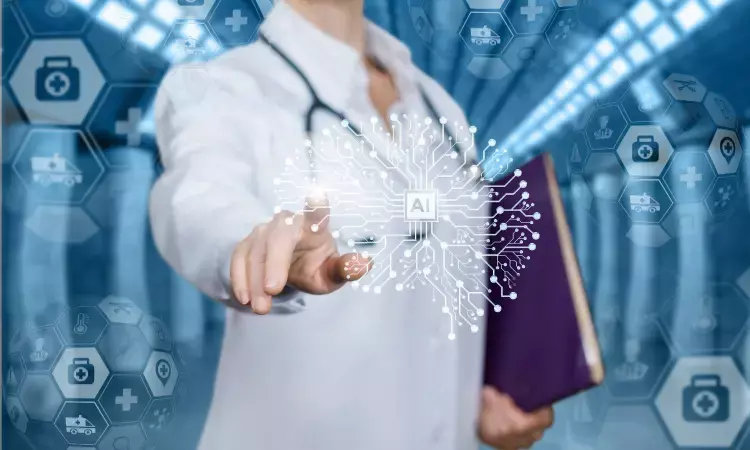- Home
- Medical news & Guidelines
- Anesthesiology
- Cardiology and CTVS
- Critical Care
- Dentistry
- Dermatology
- Diabetes and Endocrinology
- ENT
- Gastroenterology
- Medicine
- Nephrology
- Neurology
- Obstretics-Gynaecology
- Oncology
- Ophthalmology
- Orthopaedics
- Pediatrics-Neonatology
- Psychiatry
- Pulmonology
- Radiology
- Surgery
- Urology
- Laboratory Medicine
- Diet
- Nursing
- Paramedical
- Physiotherapy
- Health news
- Fact Check
- Bone Health Fact Check
- Brain Health Fact Check
- Cancer Related Fact Check
- Child Care Fact Check
- Dental and oral health fact check
- Diabetes and metabolic health fact check
- Diet and Nutrition Fact Check
- Eye and ENT Care Fact Check
- Fitness fact check
- Gut health fact check
- Heart health fact check
- Kidney health fact check
- Medical education fact check
- Men's health fact check
- Respiratory fact check
- Skin and hair care fact check
- Vaccine and Immunization fact check
- Women's health fact check
- AYUSH
- State News
- Andaman and Nicobar Islands
- Andhra Pradesh
- Arunachal Pradesh
- Assam
- Bihar
- Chandigarh
- Chattisgarh
- Dadra and Nagar Haveli
- Daman and Diu
- Delhi
- Goa
- Gujarat
- Haryana
- Himachal Pradesh
- Jammu & Kashmir
- Jharkhand
- Karnataka
- Kerala
- Ladakh
- Lakshadweep
- Madhya Pradesh
- Maharashtra
- Manipur
- Meghalaya
- Mizoram
- Nagaland
- Odisha
- Puducherry
- Punjab
- Rajasthan
- Sikkim
- Tamil Nadu
- Telangana
- Tripura
- Uttar Pradesh
- Uttrakhand
- West Bengal
- Medical Education
- Industry
Doctors with knowledge of AI will hold advantage: Andrew Elder, Royal College of Physicians

Artificial Intelligence (AI) will never completely replace a doctor's job, but medical practitioners knowing the technology will be in an advantageous position compared to those who do not, Prof Andrew Elder, President of the Royal College of Physicians of Edinburgh, has said.
AI has the potential to carry out a number of medical tasks such as diagnosis and surgery more efficiently, quickly, and easily, cutting down the time taken to treat a patient fully, compared to the duration it now takes, he said.
However, Elder said it may take another couple of decades for AI to play a significant role in disease diagnosis, but the human application of judgment will continue to be in practice even after that.
Also Read:A New AI tool to replace doctors notes?
"The advantages of AI would be so great that a doctor who says 'I am not using AI at all' will not be as able in his practice as a doctor who uses AI. Too often, we think about humans against technology, and sometimes humans or technology. It should be human with technology," Elder told PTI in an interview.
The 65-year-old who has been a consultant in medicine for elderly people for 28 years attached to England’s National Health Service (NHS), also believes that there could be fewer doctors in future due to the impact of AI.
"But I do not see it completely replacing them," he said.
Elder said, "There are at the moment some applications of AI in procedures, but most of the robotic surgeries we have been hearing about do not involve AI…. There are some limited applications in procedures of surgery at the moment, but not that widespread."
The former medical director of MRCP (UK), who was in Kolkata to be part of a conference, added that AI will possibly not be able to judge all situations as that ability comes from experience.
"I think it (AI) has the potential to make some medical tasks more efficient and more quickly to derive information from big databases. I think, however, its role in diagnosis is 10 to 20 years away before we get to choose whether we could be comfortable using it," he said.
"There are at the moment some applications of AI in procedures, but most of the robotic surgeries we have been hearing about do not involve AI…. There are some limited applications in procedures of surgery at the moment, but not that widespread," he said.
On AI's role in drug manufacturing, Elder referred to its contribution to quick vaccine development during the COVID-19 pandemic.
"AI has been used to narrow down the selection of different molecules that may be useful. It was used during the Covid-19 pandemic to help with vaccine development and it did it more quickly than humans could have done.
"Although, overall most people would acknowledge that AI did not contribute as much as people thought it might in the pandemic. Particularly the diagnostic application of AI in the pandemic was not strong," he said.
Elder also pointed out the possible threats to AI usage in healthcare in case it is developed by untrained people, particularly in the field of medical science.
"I think that if the development of AI in healthcare is predominantly in the hands of people, who are not medically trained, it could go in all sorts of unhelpful directions driven primarily by commercial interests either to generate income or to make healthcare less costly.
"It's very important for people who understand patient care and science to be involved in the development," he stated.
Kajal Rajput joined Medical Dialogues as an Correspondent for the Latest Health News Section in 2019. She holds a Bachelor's degree in Arts from University of Delhi. She manly covers all the updates in health news, hospitals, doctors news, government policies and Health Ministry. She can be contacted at editorial@medicaldialogues.in Contact no. 011-43720751


